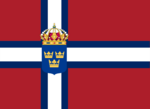Duchy of Dondora: Difference between revisions
No edit summary |
No edit summary |
||
| Line 22: | Line 22: | ||
The Duchy of Dondora was founded in 1745 after declaring independence from the Holy Roman Empire. After declaring independence, the Duchy of Dondora took control of Schleswig-Holstein, and began establishing themselves as a soverign country. The Holy Roman Empire attempted to re-annex them, however it faced more internal conflicts, leaving the Duchy of Dondora to it's own devices. Soon, the Kingdom of Prussia would seek colonial expansion, and would invade the city of Copenhagen and launch an attack on the Dutchy of Dondora in the process. That battle would be known as the Battle of Copenhagen. | The Duchy of Dondora was founded in 1745 after declaring independence from the Holy Roman Empire. After declaring independence, the Duchy of Dondora took control of Schleswig-Holstein, and began establishing themselves as a soverign country. The Holy Roman Empire attempted to re-annex them, however it faced more internal conflicts, leaving the Duchy of Dondora to it's own devices. Soon, the Kingdom of Prussia would seek colonial expansion, and would invade the city of Copenhagen and launch an attack on the Dutchy of Dondora in the process. That battle would be known as the Battle of Copenhagen. | ||
The Battle of Copenhagen was a pivotal event in the history of the Kingdom of East Prussia and the Duchy of Dondora. In the late 18th century, both nations were seeking to expand their territories and tensions were high between them. The Dondorian army, led by skilled commanders, had prepared for a potential conflict and had put in place innovative tactics and strategies to fend off the invading forces. However, the East Prussian army launched a surprise attack, catching the Dondorians off guard and quickly gaining the upper hand. | [[File:BattleOfCopenhagen.jpg|thumb|150px|left|Painting of the Battle of Copenhagen]]The Battle of Copenhagen was a pivotal event in the history of the Kingdom of East Prussia and the Duchy of Dondora. In the late 18th century, both nations were seeking to expand their territories and tensions were high between them. The Dondorian army, led by skilled commanders, had prepared for a potential conflict and had put in place innovative tactics and strategies to fend off the invading forces. However, the East Prussian army launched a surprise attack, catching the Dondorians off guard and quickly gaining the upper hand. | ||
Despite their valiant efforts, the Dondorian army was ultimately unable to withstand the superior military might of the East Prussian forces, resulting in a significant defeat for the Duchy of Dondora. The loss had a profound impact on the political and economic stability of the Duchy, and it took years for the people of Dondora to recover from the loss of life and resources. | Despite their valiant efforts, the Dondorian army was ultimately unable to withstand the superior military might of the East Prussian forces, resulting in a significant defeat for the Duchy of Dondora. The loss had a profound impact on the political and economic stability of the Duchy, and it took years for the people of Dondora to recover from the loss of life and resources. | ||
Revision as of 23:36, 22 March 2023
Duchy of Dondora | |
|---|---|
|
Flag | |
 | |
| Capital | Hasbjerg |
| National Language | Danish, English |
| Ethnic groups |
|
| Demonym(s) | Dondorian |
| Government | Duchy |
• King | King Sebastian |
| Population | |
• Census | 420,299 |
| Currency | Dondorian Dollar (DD) |
The Duchy of Dondora is a country situated on the Jutland Peninsula, bordering Germany to the south. The Duchy of Dondora, as it is now known, is a constitutional monarchy with a parliamentary system of government, with a hereditary duke as its head of state. The country's landscape is primarily consist of flat terrain, with some rolling hills in certain areas. Its climate is be temperate, with mild summers and cool winters. The Duchy of Dondora's economy depends mainly on agriculture, particularly dairy farming, and the manufacturing industry. The country's culture is be heavily influenced by its Scandinavian heritage.
History
The Duchy of Dondora was founded in 1745 after declaring independence from the Holy Roman Empire. After declaring independence, the Duchy of Dondora took control of Schleswig-Holstein, and began establishing themselves as a soverign country. The Holy Roman Empire attempted to re-annex them, however it faced more internal conflicts, leaving the Duchy of Dondora to it's own devices. Soon, the Kingdom of Prussia would seek colonial expansion, and would invade the city of Copenhagen and launch an attack on the Dutchy of Dondora in the process. That battle would be known as the Battle of Copenhagen.
The Battle of Copenhagen was a pivotal event in the history of the Kingdom of East Prussia and the Duchy of Dondora. In the late 18th century, both nations were seeking to expand their territories and tensions were high between them. The Dondorian army, led by skilled commanders, had prepared for a potential conflict and had put in place innovative tactics and strategies to fend off the invading forces. However, the East Prussian army launched a surprise attack, catching the Dondorians off guard and quickly gaining the upper hand.
Despite their valiant efforts, the Dondorian army was ultimately unable to withstand the superior military might of the East Prussian forces, resulting in a significant defeat for the Duchy of Dondora. The loss had a profound impact on the political and economic stability of the Duchy, and it took years for the people of Dondora to recover from the loss of life and resources.
In the aftermath of the battle, the people of Dondora were left reeling, but they remained resilient and determined to overcome the obstacles that lay ahead. They focused on modernizing and improving their military tactics while working to rebuild their infrastructure and economy. The Dondorian army underwent significant changes, and new training methods were implemented. They began to incorporate the latest military technologies into their operations, and the Dondorian navy underwent significant changes, with new ships and weaponry being introduced to provide greater protection to the coastal regions.
The Duchy of Dondora soon emerged as a thriving hub of commerce and trade, as the people worked tirelessly to rebuild their economy. The defeat at the Battle of Copenhagen had served as a wakeup call to the people of Dondora, spurring them on to greater heights of innovation and success. The lessons learned from the battle had been ingrained into the fabric of Dondorian society, shaping the nation's military and political strategies for generations to come.
Today, the Duchy of Dondora stands as a formidable regional power, with a strong economy, a powerful military, and a united populace. The scars of the past still linger, but the people of Dondora are proud of their history and are committed to defending their land and their way of life. As the 18th century draws to a close, the Duchy of Dondora stands as a beacon of strength and resilience, a testament to the indomitable spirit of its people.

